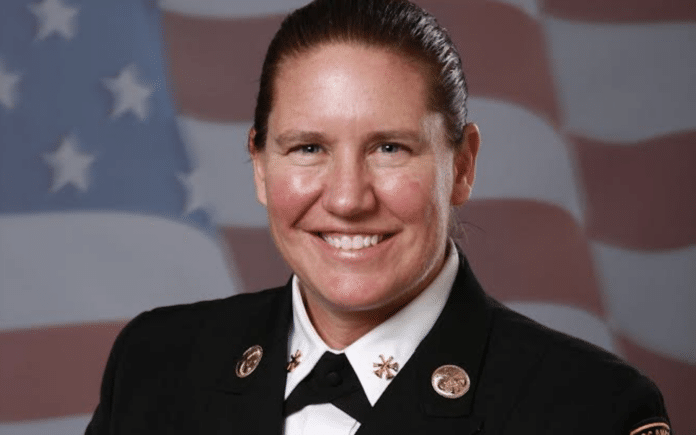
It’s now official, Kristin Crowley will be the first woman to lead the 3,779-person Los Angeles Fire Department (LAFD) in its 136-year history. The Los Angeles City Council unanimously approved her nomination for the position on March 1, which was also the first day of Women’s History Month.
Los Angeles (LA) Mayor Eric Garcetti nominated Crowley for the job on Jan. 18 after the current chief, Ralph Terrazas, announced his retirement effective March 26. This came months after female firefighters accused Terrazas of failing to address “a pervasive racist and sexist culture” of cruel pranks, sexual harassment, and assault within the LAFD.
Crowley is a 22-year department veteran who continuously rose through the ranks to her current position as Deputy Chief. Prior to that position, she was LA’s first female Fire Marshal. But, lest anyone think she got the Fire Chief job just because she’s a female at a time when it was politically expedient to have a woman at the helm of the LAFD, she also has a distinguished track record as a firefighter.
On the pitch dark day of the Woolsey Fire back on Nov. 9, 2018; when a majority of Malibu residents were evacuating, Crowley and her wife Hollyn Bullock (retired LAFD); were headed towards the fire. They had been tracking Woolsey’s progress since the night before. Hollyn’s mother, Joyce Bullock, is a Malibu resident on Avenida de la Encinal.
“Our original intent was to prep [the Bullock family house]” ahead of the fire, Crowley said in a phone interview. Prepping consists of removing anything flammable from the roof or around the house (leaves, debris, stacked wood, brush, patio furniture cushions); and closing windows and vents.
Upon arrival at Encinal around 9 a.m., “We went right to work, and also talked to neighbors and helped other families prep their homes before evacuating,” Crowley continued. She and Bullock asked each homeowner to leave their houses unlocked and put spray nozzles on their garden hoses.
When the fire crested the hill around 11:30 a.m., they knew they’d be in for a long day. Both women had old personal protective equipment with them, which included brush gloves, hats, jackets, helmets, and pants, which they put on.

Over the course of the next 16 hours, the two defended and saved a total of eight houses on the street. “We only lost one home,” Crowley said, “because it had no water supply. Neither of us had fought a brush fire for at least five years, but we went back to our training on how to protect a structure from a brush fire and were using only garden hoses and buckets.”
“We even split up for a while and did our own work,” Crowley said, which goes against the standard fire department training of always working in pairs. “But I think that definitely made a difference. We knew we would lose homes if we didn’t split up, and there were some very intense moments for both of us. We knew where our safe areas would be and had an idea of how we wanted to approach the fire.”
While working independently, Crowley headed up the street and saw a home threatened by multiple fires: vegetation around the front door, a plastic trash can in the driveway, a woodpile, two large pine trees, and the tile roof over the patio. She spent over an hour dousing those flames, helped by the fact that the neighborhood’s gravity-fed 70,000-gallon tank continued to provide good water pressure.
By about 2 p.m., Bullock became concerned regarding Crowley’s whereabouts; as flames began rising from an additional ridge, smoke was thickening, and a large ember cast was flying in the air. Crowley didn’t hear Bullock’s shouts or car horn because she was busy putting out burning palm fronds and railroad ties at another house; then moved on to two more homes threatened by flames from a ravine, burning landscaping, and a burning wooden deck.
At about 3:30 p.m., Crowley returned to the Bullock family house to meet up with her partner; and the two worked together moving from home to home and extinguishing spot fires that had re-ignited due to increased wind. Bullock used buckets of pool water to put out flames once water pressure was lost around 10 p.m. After midnight, the fire had moved on, and Bullock and Crowley decided nothing more could be done.
When Crowley returned to the neighborhood on Nov. 12, she was happy to find all of the houses they defended remained intact.
“We clearly owe an enormous debt of gratitude to Kristin Crowley and Hollyn Bullock. Their fearless efforts on Nov. 9 undoubtedly saved not only Hollyn’s mother’s home, but many others,” neighbor Bruce Gipe, MD, wrote.
As a follow-up, The Malibu Times contacted Crowley to congratulate her on her new position and ask if, in hindsight, there were any “lessons learned” (as firefighters like to say) from her Malibu Woolsey experience.
She said there were several—some personal and some for the neighborhood they helped save.
Personally, she and her wife experienced much stress over failing to plan who would pick their three kids up from school if they weren’t back in time; and once they got to Malibu, they had no cell phone service. That was one lesson learned.
Second, “If there’s ever a next time, we need to have communication between the two of us if we decide to split up [while fighting the fires], like two-way radios.”
Last, “There should’ve been a better plan in that neighborhood, like a phone tree and training in ‘ready-set-go;’ because they were really scrambling. People need to be continually prepared.”
Mother-in-law Joyce Bullock is still alive and well in her Malibu home at the age of 93.
